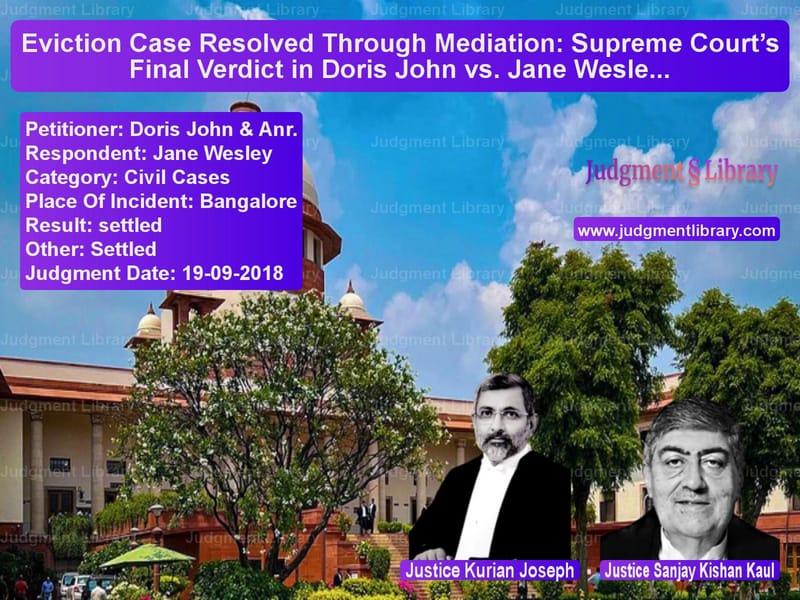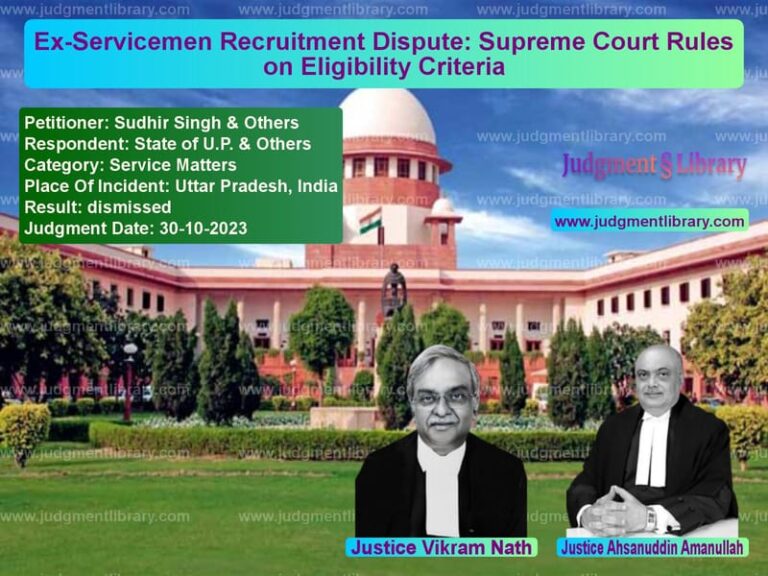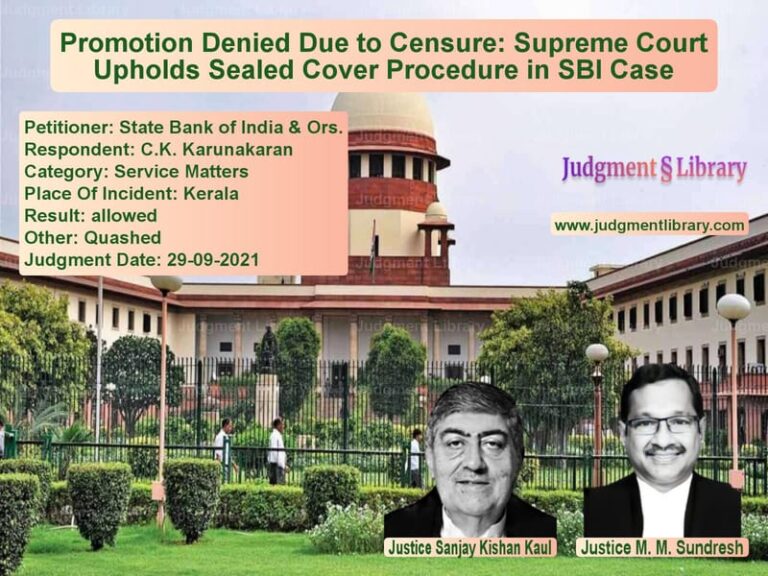Eviction Case Resolved Through Mediation: Supreme Court’s Final Verdict in Doris John vs. Jane Wesley
The Supreme Court, in its judgment dated September 19, 2018, in the case of Doris John & Anr. vs. Jane Wesley, provided a significant resolution to a long-standing property eviction dispute. The case, which had been in litigation since 1992, was ultimately settled through mediation, highlighting the importance of alternative dispute resolution mechanisms in the Indian judicial system.
Background of the Case
The dispute began when the respondent, Jane Wesley, filed an eviction suit against the appellants, Doris John & Another, in 1992. The case initially went before the Trial Court, which ruled in favor of the appellants and dismissed the eviction petition. However, when the respondent appealed to the High Court, the decision was overturned, and the eviction was upheld.
Aggrieved by the High Court’s ruling, the appellants approached the Supreme Court, seeking relief from the eviction order. The case was initially poised for a full legal battle, but the Supreme Court recognized an opportunity for settlement and referred the matter to mediation.
Arguments by the Appellants
The appellants, Doris John & Another, contended that:
- The eviction suit was baseless and lacked proper legal justification.
- They had possessed the disputed property for an extended period and had legal rights over it.
- The Trial Court had rightly dismissed the eviction petition, and the High Court erred in overturning that decision.
- The respondent failed to establish legal grounds for eviction.
- The case had been pending for decades, causing undue hardship to the appellants.
Arguments by the Respondent
The respondent, Jane Wesley, countered these claims with the following arguments:
- The eviction suit was filed in accordance with the law and was fully justified.
- The appellants had no legal claim over the property and were unlawfully occupying it.
- The High Court’s ruling was based on sound legal reasoning and should not be disturbed.
- The appellants had not paid proper rent or followed tenancy agreements.
- The dispute had already been decided in favor of the respondent, and the appellants were prolonging the case unfairly.
Supreme Court’s Observations
During the hearings, the Supreme Court observed that the case had been pending for an exceptionally long period and that there was scope for an amicable resolution. The Court noted that lengthy litigation often leads to financial and emotional stress for both parties and encouraged them to consider mediation as a means of settlement.
Recognizing the possibility of a resolution outside the court, the Supreme Court referred the matter to the Bangalore Mediation Centre to facilitate negotiations between the parties.
Mediation Proceedings and Settlement
The mediation process at the Bangalore Mediation Centre resulted in a mutually agreeable resolution. Both parties engaged in negotiations and agreed to settle their disputes amicably.
The settlement terms were recorded in a Memorandum of Settlement dated May 30, 2018. The contents of this settlement were confidential, but it effectively resolved all outstanding disputes between the parties, avoiding further litigation.
Supreme Court’s Final Judgment
Taking note of the successful mediation, the Supreme Court ruled:
- The appeal was disposed of in accordance with the Memorandum of Settlement dated May 30, 2018.
- A decree was drawn based on the settlement agreement, bringing finality to the case.
- All pending applications related to the case were disposed of.
- No orders regarding costs were passed, meaning both parties bore their respective legal expenses.
Legal Implications of the Judgment
This ruling has several important legal implications:
1. Encouragement of Alternative Dispute Resolution (ADR)
The judgment underscores the importance of mediation as an effective tool for resolving disputes. Courts are increasingly encouraging parties to consider ADR methods to reduce the burden on the judicial system.
2. Finality to Long-Standing Legal Disputes
The case had been ongoing for over two decades. The mediation process ensured that both parties reached a mutually beneficial solution, bringing finality to the dispute.
3. Judicial Endorsement of Mediation
The Supreme Court’s decision to refer the matter to mediation highlights the judiciary’s endorsement of out-of-court settlements. This serves as a precedent for future cases where amicable resolutions are possible.
4. Cost-Effective and Time-Saving Resolution
By opting for mediation, both parties avoided prolonged litigation, saving time and legal costs. This case exemplifies how mediation can be a viable alternative to court proceedings.
Conclusion
The Supreme Court’s decision in Doris John & Anr. vs. Jane Wesley serves as a landmark case in the promotion of mediation as a dispute resolution mechanism. The case, which had been in litigation since 1992, was finally resolved through an amicable settlement, demonstrating the effectiveness of mediation in resolving long-standing legal conflicts.
This ruling sets an important precedent, reinforcing the idea that litigation should not always be the first resort. Instead, parties in legal disputes should explore mediation and other ADR mechanisms to achieve faster, fairer, and less costly resolutions.
Petitioner Name: Doris John & Anr..Respondent Name: Jane Wesley.Judgment By: Justice Kurian Joseph, Justice Sanjay Kishan Kaul.Place Of Incident: Bangalore.Judgment Date: 19-09-2018.
Don’t miss out on the full details! Download the complete judgment in PDF format below and gain valuable insights instantly!
Download Judgment: Doris John & Anr. vs Jane Wesley Supreme Court of India Judgment Dated 19-09-2018.pdf
Direct Downlaod Judgment: Direct downlaod this Judgment
See all petitions in Property Disputes
See all petitions in Landlord-Tenant Disputes
See all petitions in Dispute Resolution Mechanisms
See all petitions in Judgment by Kurian Joseph
See all petitions in Judgment by Sanjay Kishan Kaul
See all petitions in settled
See all petitions in settled
See all petitions in supreme court of India judgments September 2018
See all petitions in 2018 judgments
See all posts in Civil Cases Category
See all allowed petitions in Civil Cases Category
See all Dismissed petitions in Civil Cases Category
See all partially allowed petitions in Civil Cases Category







